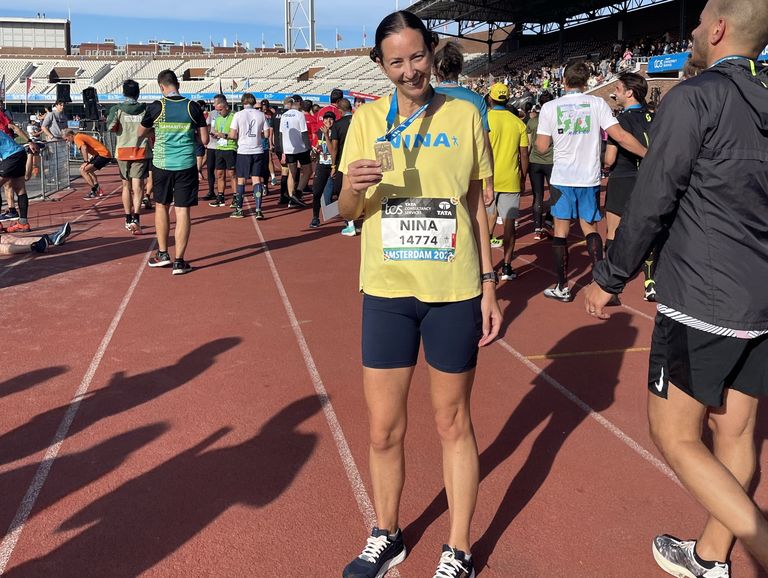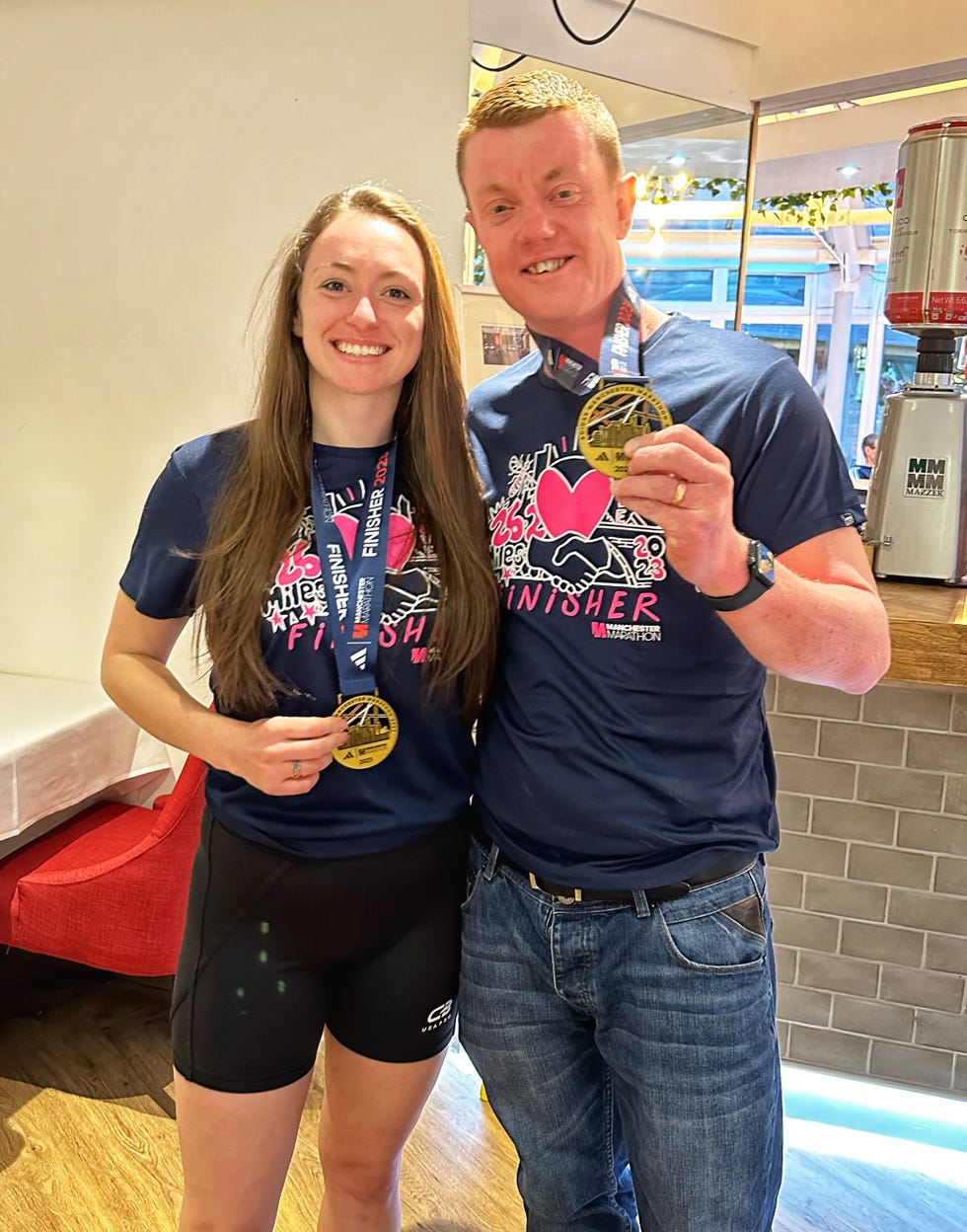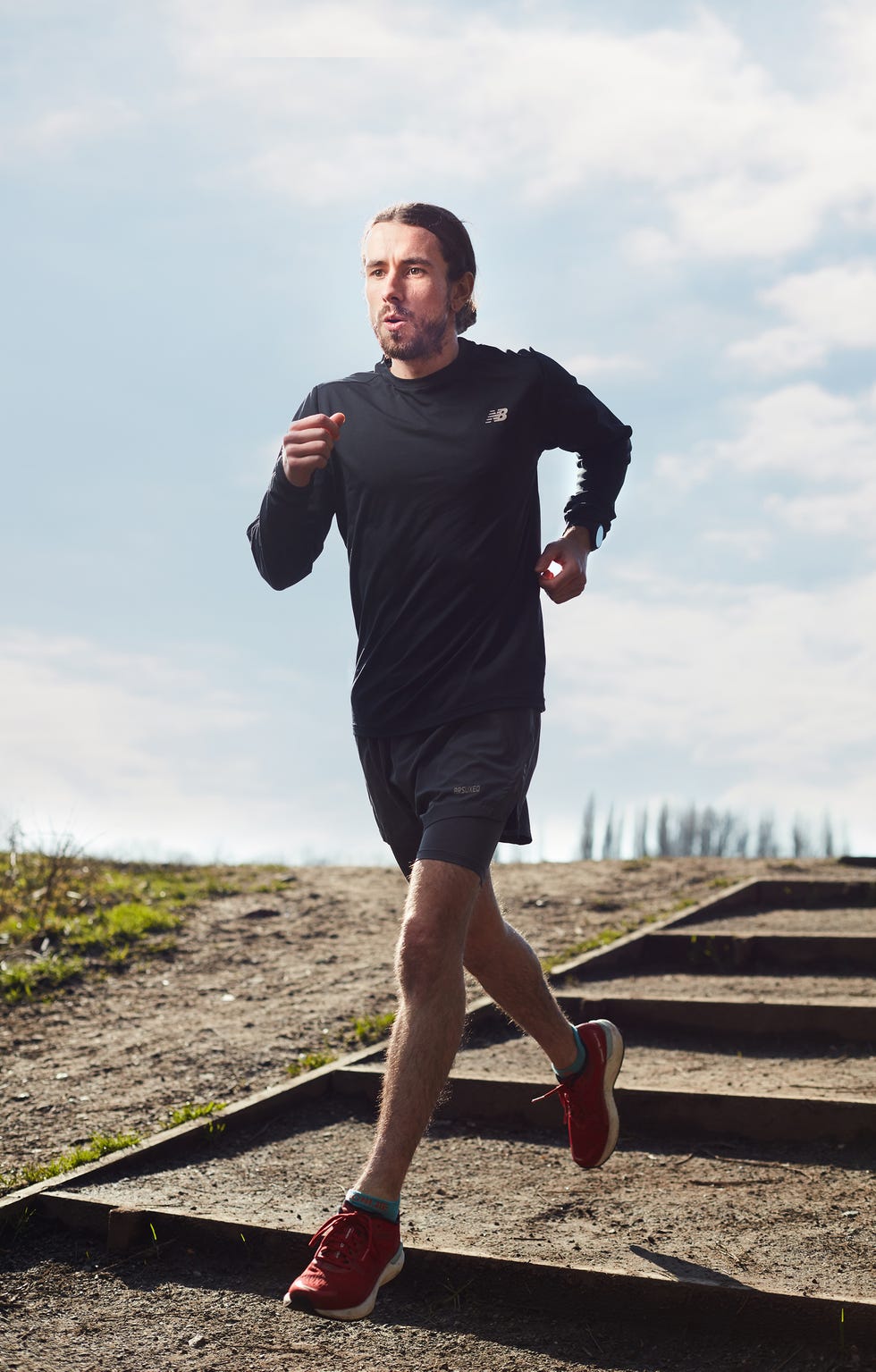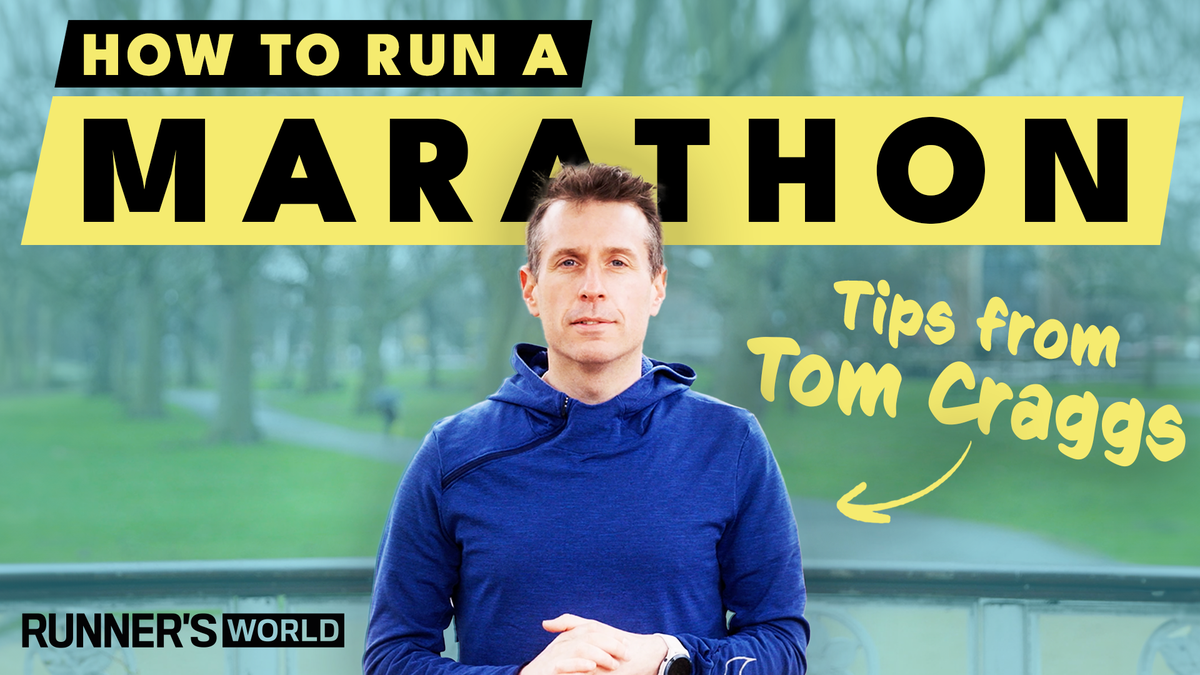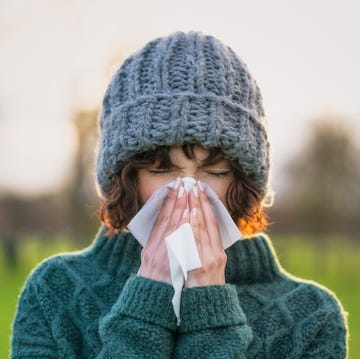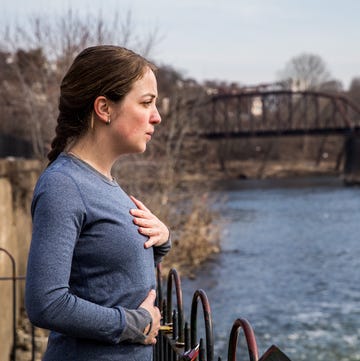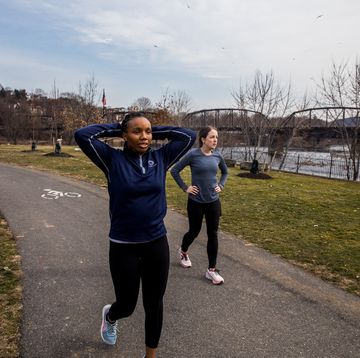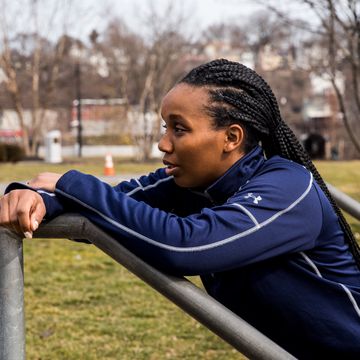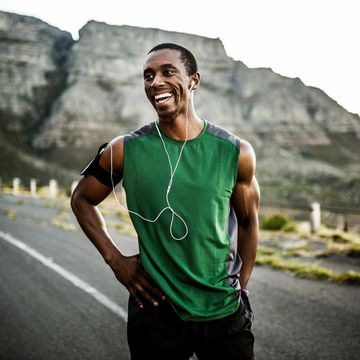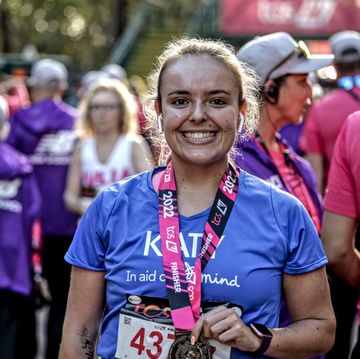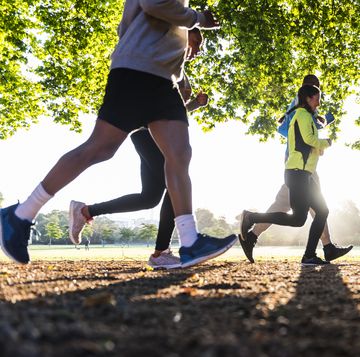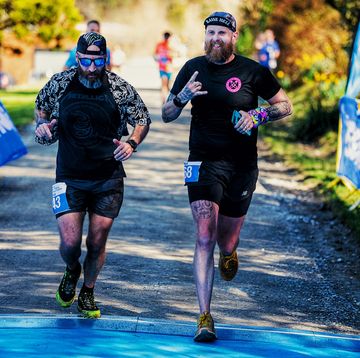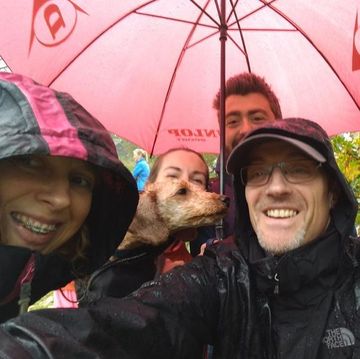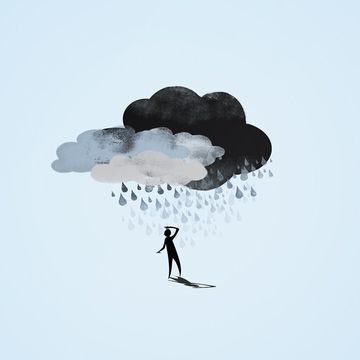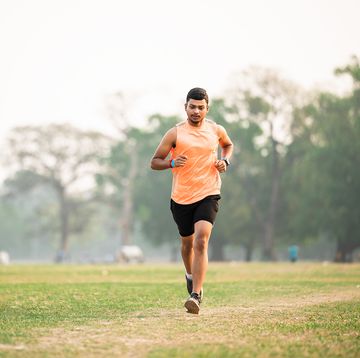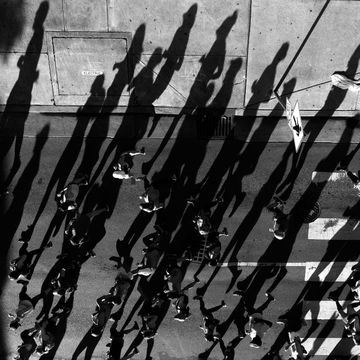For many people, lacing up their running shoes is fundamental to their mental health. In fact, in a recent Runner's World Twitter poll, 90.5% said they run to look after their mental wellbeing.
Over the years, we've heard countless stories from readers on how running has been able to transform their mental health – and even take some on a journey out of a very dark place in their lives. To mark World Mental Health Day (10 October 2023), we asked some of these readers to share their personal stories of how running has helped them find their way through...
Running has helped Mark Wright manage his anxiety and depression
'A decade ago I was a mess. My mother's sudden death when I was in my 20s led me down a spiral of alcoholism, anxiety and depression. I topped the scales at 25st, and all this led to an unsuccessful suicide attempt. That failed attempted was like a lightbulb moment: I decided to make some changes and the biggest was joining a gym. On the first day I started with the treadmill. Fast forward to today and I have just completed my first marathon in Manchester.
Running has changed my life and although the anxiety is never far away, the time running allows me to get out in nature which helps and also put my thoughts in order. The feeling of accomplishment also helps that self doubt that anxiety causes. I think the running community is so supportive both online and offline and this helps tremendously, too.'
National Suicide Prevention Helpline: 0800689 5652; sane.org.uk/home
Running helped Alex MacDonald recover from debilitating agoraphobia
‘For six months I couldn’t leave the house because I was terrified of having a panic attack. I decided I had to do something about it and running became a reason to get outside. It allowed me to slowly build up safe spaces near my home, bit by bit.
It started in my second year of uni, in 2017. Until then I’d never experienced any mental health issues. But at university I was experimenting with drugs, alcohol and partying. In hindsight, it put a huge stress on my body, particularly as I was working in a pub and I had all my uni work to do as well.
I had my first panic attack at a party in late 2017 and it spiralled from there. I had to go on medication. I was at the doctor’s every week and having panic attacks each day. I couldn’t last an hour without one and had no way to control it. By 2019, a year after I graduated, I had gained more control over how to manage it. But then I had some family issues and it spiralled again. This time I couldn’t leave the house. I had agoraphobia, which is a fear of being outside your comfort zone.
I was self-employed and working from home, so I didn’t need to leave the house. My body started reacting to almost anything. I was anxious about being around certain people. If I tried new food I’d be worried about having a reaction. Then it was about being outside – I was afraid of having a panic attack and not being able to calm down if I was out of the house in an unfamiliar area.
I was prescribed a beta blocker, to block the adrenaline when I felt anxious. It worked, but it meant I wasn’t facing the root of the problem. In January 2020, I decided I needed to do something about it. I went to an anxiety help group and learned about the science behind it. The key thing was the more you avoid something, the harder it gets. I was avoiding leaving the house.
I wasn’t ready to get in a car and drive somewhere, so I decided running was the only option to get out of the house with a purpose. There was a park a few streets away that was a square of exactly 1km. On my first run, I ran to the entrance and back home again. The furthest I could do was the park gate, which was two minutes away.
Gradually I built up to three times a week and increased the distance. I would make it halfway around the park loop and come back, then a full loop. Over a period of eight months, it slowly progressed to 15km around the same loop.
Initially I was only comfortable in this one space, as it was easy to get familiar with it. Then I started adding another street, or finding different ways to get to the park. I used running as the main tool to rediscover what I was capable of. The park would always be central. If I was running in a different direction I would feel anxious but I knew I could get back to the park. All my runs were meticulously planned – I’d spend half an hour looking at Google Maps.
I can now run in any direction for any amount of time. I moved house six months ago and I had to find new comfort zones and new routes, but it was much easier this time. I started by going around a nearby lake and running that route over and over. I got comfortable with it, then expanded it. Now I run 50km to 70km a week, and the next goal is to get outside my local area.
Running has also motivated me to pivot my business and I want to become a race director. I was looking at races a year ago and wanted to run an ultra in the Peak District, but driving long distances is still a challenge for me. So I decided to launch my own ultra in 2023 which is loops of a local park, making it accessible to everyone.
I haven’t had a panic attack for over a year now, plus I find that I have a lot more confidence. Sometimes I run for two hours and can’t remember any of it. It’s like moving meditation.’
Anxiety UK helpline: 03444 775 774; anxietyuk.org.uk/anxiety-type/agoraphobia. Follow Alex’s new event on Instagram: @theultraloop
Running helped Alice Welch, 46, cope with social anxiety
'I had huge social anxiety after university. I am the third eldest of eight children, and my relationship with my mother had been non-existent growing up. Mum had been sexually abused as a child. I couldn’t get my head around any of it.
I ran as a child aged 11 at a club but stopped aged 14. Whilst at university, I began to run again, around the block. I’d never get a call from home asking how I was doing, the running kind of took me out of my head and helped me get through uni, which was a very anxious time. When I finished university, I went home and ran with my mum which helped me to connect with her again. I had to have CBT to deal with social anxiety but the running was instead of any anti-depressants.
Now I run a running group and coach athletics, and I am a mental health champion for a RunTogether group. I started just before Covid and still going strong. I still run through my menopausal symptoms which also helps my anxiety.'
Samaritans helpline: 116 123; samaritans.org
Running helped Eleanor Baverstock to recover from an eating disorder
‘At my lowest point, I weighed very little and was put on bed rest for six months. I was only 18 years old and I was already literally on my death bed.
I used my eating disorder to control my life, but running became my reason to get better, rather than another way of controlling my weight. The more I looked after myself, the more I could do, the faster and further I could go. I completely switched my mindset and realised that I needed to fuel myself if I wanted to run, otherwise I would get injured. Now, 10 years after that awful time, I’m a healthy weight and I recently won second female in my first 100-mile ultramarathon.
If you run ultras you can’t eat like a normal person. You need to be eating 2,500 to 3,000 calories each day, sometimes more. Running has helped me to move away from society telling you, “You should only eat this or that amount.” I know that I need to be eating more than other people.
Running has also given me an identity, which I lost when I was unwell. I am on top of my eating disorder now and this past year has felt awesome. I’m no longer in a toxic relationship and I have been able to buy my own house. Looking after myself has helped me achieve everything and running has been my motivation to do it all.
I suffered with an eating disorder from the age of 13 and, after an intervention by a friend at 16, I was diagnosed with anorexia. From that point, things went downhill rapidly. Even though I was having weekly therapy sessions and regular check-ups, the mental side took over and it was all about perfectionism. I dropped out of college and then one day, my doctor said I had to go to an inpatient centre because my heart rate was too low. I refused. It wasn’t until my mum said, “I can’t do this any more” that a switch flicked in my head. At that point I wasn’t Ellie, I was my eating disorder. But I had a moment of clarity and I agreed to do what the doctor asked, just at home instead of the inpatient centre.
I had to stay in bed for six months and couldn’t leave the house. The first step was a high-calorie diet. It was incredibly tough, but I had to get my weight up first before the therapy because my brain wasn’t functioning properly at that time.
I started to put weight on and continued the therapy until I was 21. I then met my partner at the time, who I thought had come to save me. He positioned himself as my hero and he recommended I stop therapy. But what started as a perfect relationship soon turned into something that was very controlling.
I started running aged 24, to escape my partner and get out of the house. I signed up for the Great North Run and it gave me so much joy and a massive sense of accomplishment. I felt strong again and it made me value myself more.
The following year I joined a running group where I lived in Milton Keynes. I met people who were so encouraging and gave me a very supportive place to be. By 2018, I was on top of my eating, feeling really good and ran my first two ultramarathons. But then I got injured, my partner became even more controlling and I lost the release that running gave me. My eating disorder tendencies started to come back and I got into quite a bad place again.
It wasn’t until 2020 that I stepped away from the relationship and decided to move back to my parents’ house for lockdown. Again, running was my saviour and forced me to start fuelling myself properly.
During my first 100-miler on the North Downs Way, I made sure I ate at each of the 13 checkpoints and I completed it in 22:49. Next year I’m taking on the South Downs Way, another 100-miler, and I’ve got a 50K and a 50-miler race coming up soon as part of my training.
I’m incredibly lucky because I work from home and it’s just me and my cat. I can train 80 miles a week on the local Leicestershire trails and I find I flow best on high, easy mileage. I’m in the best shape that I’ve ever been, both physically and mentally.’
Beat helpline: 0808 801 0677; beateatingdisorders.org.uk
Running has helped Nina Mattinson manage her anxiety
'My sister is 14 years my junior and has had cancer multiple times. The first time she had cancer was when she was two years old. I was devastated. I was not sure what to do – all I could do was try to keep positive and help my mum keep my sister smiling. Thinking back to that time, this is where my anxiety started, trying to hold it all together for my mum and my sister.
Being the eldest and her the baby, I felt responsible for her and always tried to protect her the best I could, but I couldn’t do anything for her. By the time my sister was diagnosed with cancer for a third time and had countless hectic procedures (including a leg amputation), she’d already spent months and months in hospitals for procedures or chemo and my nerves were literally shot. I was diagnosed with anxiety. Powerless to help my sister, the thought of her going through any more trauma petrified me and anxiety took hold, paralysing me.
I came across a leaflet in the hospital whilst visiting her about Cancer Research and the Race for life. Something in me screamed out: this is how you can help her. She can’t run, but there’s nothing to stop you from trying. The quicker Cancer Research can find a cure, the less likely she’ll get cancer again. Something clicked in me and I signed up to a local race. Determined to raise funds in her name while she was in hospital, I hosted a fundraising tea party and crochet tutorial to gain sponsorship and I raised £1000 that first year whilst training to do a 5K
I soon realised the running helped me with my anxiety: focusing on running to raise funds for Cancer Research distracted me from it. And it gave me space to think, to run my anxiety away, to just breathe, and it gradually helped me understand that you just need to keep going, one foot in front of the other, there is no other way but through it. The pain you feel in the moment too shall pass.
I still run for cancer charities at every opportunity I get. My sister has since had many, many more very scary procedures and even further cancer diagnosis', but I do not think I’d have been able to cope with the anxiety which flooded in on the subsequent bad news revelations without my running. My running has literally kept me sane.
Anxiety UK helpline: 03444 775 774; anxietyuk.org.uk
Running has helped Nick Jones in his fight with lung disease
‘When I was first diagnosed I couldn’t even complete the tests because I was coughing so much and struggling to breathe. But now my lung capacity has shot up from 60% to 80% and I’ve reduced my medication by 25% – all because of running.
I have a rare condition called sarcoidosis, which means I have little nodules on my lungs. They will never go, they are like scar tissue. They keep growing, which means they reduce my lung capacity and although I don’t like to look up stuff online, some sites say life expectancy is 10 years from diagnosis. But I’m fighting it with running and medication. My consultant jokes that other people are in wheelchairs with an oxygen tank and I come in after running a marathon and he doesn’t need to see me. Before my diagnosis in 2017 I didn’t really run much, other than a few Tough Mudder events. It was actually during one of those races, in 2016, that I had a really bad reaction when I took on the Arctic Enema water obstacle. I got severe pain across my chest and couldn’t breathe. I saw the doctor and was told it was asthma and to use an inhaler. I had one to use twice a day and one for attacks. It wasn’t until my GP surgery closed down and I was transferred to a new practice that my condition actually got picked up.
The asthma nurse was concerned because I grew up in pubs where there was a lot of passive smoking and I work as a surveyor, so have been in buildings with asbestos. They wanted me to see a specialist, so they referred me for a lung biopsy. I wouldn’t wish one on my worst enemy. They put two tubes down me, a camera and one that scrapes your lung, all while you are awake.
I remember the day I got my diagnosis. It was 19 May 2019 and we were at a friend’s house to watch Harry and Meghan’s wedding. When I was diagnosed I really did struggle and went downhill mentally. But my specialist told me to keep running and to listen to my body. I thought, “Do I sit in a wheelchair taking oxygen, or do I do something about it?”
Now I run between 35 and 50 miles a week and I’m currently running 52 half marathons in a year, one a week. It’s been good for both my mental health and my sarcoidosis. If I don’t run for a few days my family tell me to go out for one because I get grumpy and my lungs start to ache.
I’m no longer running just for the fun of it, but to keep me alive. Although cold air makes me cough a lot, my lung capacity has got much better. I’m 50 but my PBs have come down a lot. This year I did my first 3:49 marathon.
I was shielding during lockdown, but my consultant told me to keep running, so I ran a marathon in my garden and raised over £1,000 for the NHS. And my running is actually a good way of monitoring my condition. I keep an eye on my pace and if it suddenly starts dropping, I’ll let my consultant know, because that could be a sign that my lungs are deteriorating.
I run up the 360 steps at St Catherine’s Hill near Winchester and that is a great way to see how my lungs are doing. I also have a watch that notifies me if I have a fall, and if I don’t respond it contacts my wife and calls the emergency services. I still take four tablets a day and an inhaler twice a day, but I haven’t used my inhaler for an attack in three years.’
sarcoidosisuk.org; justgiving.com/fundraising/nick-jones1971
Running helped Helen Foster in her recovery from depression
‘I have struggled with depression for almost three decades. I’ve never felt like I fitted in and have never had many friends. That was until I found running. It saved me from the brink of suicide.
Two weeks ago I drove six hours to Scotland and met a stranger in a car park. I stayed with her parents and they looked after me like royalty. The next day I ran a marathon with 5,000 people. I have come a long way since I started running in the dark so that no one could see me.
I have five children, aged seven to 18, so everything is about them. If I have my tea, there is a child sticking their finger in it. If I have a bath, there is a child climbing in. But running is just me. I’m 44 and I just wish that I’d found it when I was a teenager, as it would’ve saved me years of misery.
I’ve been on medication since I was 18, and have tried to kill myself twice. I’ve never found the medication to work – it just makes me feel tired. Doctors should really prescribe running, but they just throw pills at you.
After having my second set of twins in 2019, I was incredibly low. I was 5st overweight and I wouldn’t speak to anyone as I had no confidence. I decided I had to do something and on New Year’s Day 2019, I went for a run. I made sure I went at 7pm and was going down country lanes with no hi-vis because I didn’t want anyone to see me.
For nine weeks I went out in the dark and did Couch to 5K. At times it was really hard – I would be crying in the wind and rain – but I kept on going. Since then I have lost around 5st and I go out with my head held high. But it has taken time to build my confidence. When I turned up for one of my first 10K races, I went to register and I thought everyone looked like elite runners. I tried to pull out and told the organisers I wasn’t fit enough, but they were fantastic. They walked me to the start and I did it in 1:10. I felt amazing when I crossed the line. Later, the organisers told me they’d never seen anyone so scared.
Then lockdown happened and I thought I was going to die because I couldn’t go out for a run. I love running in the hills, but I couldn’t drive there. Someone reported me for going out more than once in a day and it was so stressful with home schooling. I sank into depression, got into the car and drove away feeling suicidal. I ended up calling the crisis team and the police came and took my car off me.
When the police came to do a welfare check, I begged them to let me go out and run. They let me have my car and said I could go. It was the best feeling being able to run again. It saved my life.
I now run at least four times a week and have done half marathons and marathons, making some amazing friends in the process. I’ll never be completely better, but running keeps me from slipping into a dark place. I feel like I can now cope with anything and, most importantly, I am still here.
I’m lucky to live in north Yorkshire, where there are so many beautiful places to run. I regularly go up Pen-y-ghent and Ingleborough, two of the Yorkshire Three Peaks, with no music and just my dog, Spud. It helps clear my head and reminds me how insignificant we are. When I’m running on a mountain I feel free – no one can get to me and I feel completely safe.’
National Suicide Prevention Helpline: 0800689 5652; sane.org.uk/home; Instagram: @the_running_mum_
Running helped Paul Buckley to recover from alcohol abuse
‘At the height of my drinking, I was having 50 pints a weekend and spending more than £1,000 a month on booze. Since I started running I’ve become a different person. I’ve lost over 5st and I recently won my first 10K race in 35:37. I’m now training for a sub-2:30 marathon. In the past two years I have gone from pub to podium.
I started drinking aged 12. It was just built into my life. When you’re in your teens and your twenties, going out with your friends and drinking is exciting. But as time goes on, you become bored. By the end of my twenties I was fed up of it and miserable. I was overweight, eating badly and not sleeping well. I was using alcohol to prop me up and get me through the day. I knew there was something missing, but I didn’t know exactly what it was.
In August 2019, I decided to try giving up drinking and get a bit fitter and healthier. I started with a bit of swimming, went on the treadmill and then started going out jogging. I enjoyed it straight away.
Suddenly I was sleeping better, eating better and performing better at work. It was a big eye-opener. Five months later I did my first half marathon in 2:24. I found it hard and was near the back, but then three weeks later I did another one 20 minutes quicker. I’ve now nearly halved my time and ran an 80-minute half marathon in August 2021.
Running has helped with all areas of my life, not just staying sober. I have struggled with depression and anxiety over the years. My dad died suddenly when I was 19 and I started having panic attacks. I used drinking to cope, but I wish that someone had taken me to a running track instead. It sounds so obvious now.
Even though I now run for about 10 hours a week across six days, around where I live in Chertsey, I have so much more time than before. Previously I was spending 40 hours a week in my local pub. My lifestyle change has been incredible and I feel so much happier. Without running I would never have had the free time, money or confidence to start my MBA course.
It has also helped me in my work because my job as a project manager is very stressful. Running helps give me structure and mental clarity. I am more alert and productive than I’ve ever been. I wake up energetic and I am able to tolerate stress a lot better. Before I would wake up hungover and tired, and be very snappy.
People joke with me that two years ago, the only time I would run would be for last orders at the bar. But now I am running race times that I thought were completely unachievable. Only in the past few months has it dawned on me that I’m quick and quite competitive, which was a big surprise as I’ve never been a sporty person.
I’ve done everything from 5Ks to multi-day ultras over the past couple of years. In August 2020 I ran self-supported for four days along the whole of the Hadrian’s Wall path from one side of England to the other. Then in May 2021 I ran three marathons in three days on the South West Coast Path.
I recently ran my first 5K race and finished fifth in 17:25. But the race I’m really proud of is the Bedford Marathon, which I did last July in 2:57. I realised I could start to become competitive at the marathon distance. I now have a coach and the goal of a sub-2:30 marathon, which I feel is achievable within two years. This would see me enter the British rankings in the top 100 fastest marathon runners, which is very exciting.
I really hope I can help others see they could live a more positive, happy and healthy life. I feel like I very nearly missed my opportunity and I’m now genuinely grateful for each day – running effectively gave me my life back.’
Drinkline: 0300 123 1110; drinkaware.co.uk; Instagram: @p.b_run
Running has helped Zoe Barker manage maternal anxiety and panic attacks
'I have antiphospholipid syndrome and it causes recurrent miscarriage. On the journey to having my two girls, I lost six pregnancies. As a result I suffer from maternal anxiety and sometimes struggle to manage what used to be everyday situations. For example the first time I walked on a pier with my eldest daughter I became so anxious that I would drop her through the planks or fall over the side that I was physically sick when panic overwhelmed me.
Obviously these were ridiculous scenarios but not something I could overcome in the moment. I sought counselling but found that it wasn't for me and, if anything, made me feel a lot worse in the days following the sessions. I'd always been a middle-distance runner but began to run longer distances up to half marathons and then onto full marathons. I did this with my dogs and with my daughter in her buggy, as well as with friends.
The head space, gossip and physical exertion helped me to control the anxiety and work through the bizarre intrusive thoughts that triggered panic attacks. It was a great bonding experience and I now run with a double buggy and have worked my way up to ultramarathon distance. I feel so much better for the endurance training – the mindset to keep going is what helps me overcome the maternal anxiety.'
Anxiety UK helpline: 03444 775 774; anxietyuk.org.uk
